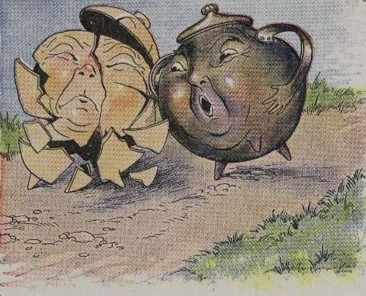Marie claims she made the collection for a Count William from an English version by "li reis Alvrez" (King Alfred, who did have an interest in history and literature), but no evidence exists for such a source work).
Many of the fables are recognizable from what we know of Aesop and Avianus, though some have small changes. Aesop's fable of the dog that sees its reflection while carrying a bone or piece of meat, and ultimately opens its mouth to attack the "other" dog and get its treat, loses what the dog had. Marie has the dog carrying a piece of cheese. The moral is the same, but did Marie originally hear the story her way, or did she change the dog's mouthful for a specific purpose. It is not clear.
Marie includes several previously unknown ones involving human characters, many of them with married couples. The story of "The Man and the Wife Who Quarreled" is a little gruesome while being funny. A husband cuts his wife's tongue out to stop her from quarreling, only to have her continue in sign language. Marie flips the gender of the moral, however, by saying "This fable shows what one can often see: if a fool talks foolishness and someone else comes along and speaks sense to him, he won't believe it but gets angry instead. Even when he knows he is absolutely in the wrong, he wants to have the last say, and no one can make him shut up."
One of her fables, "The Mouse Takes a Wife," is unique in western literature, though it has analogues from India and the Far East. It sets up a discussion about nature vs. nurture, and is worth a closer look, which we can do next time.

